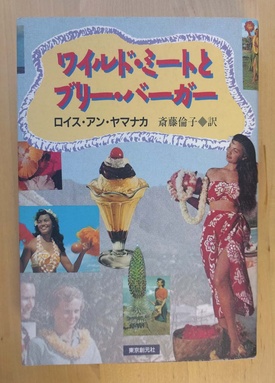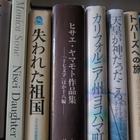Hawaii has the oldest history of Japanese immigration in the United States. The people who live there are a diverse range of races, including Asians, whites, Hispanics, blacks, and native Hawaiians and Polynesians, and the cultures that each of these people brings, combined with the unique nature, climate, and customs, have created a unique culture.
Language was one of these factors. In addition to regular English, pidgin English, a form of English mixed with local words, was also developed and used by Japanese immigrants.
The novel "WILD MEAT AND THE BULLY BURGERS" was written in this pidgin English. The author is Hawaii-born third-generation Japanese-American writer Lois-Ann Yamanaka. It was published in 1996 and in Japan in 1998, translated by Michiko Saito as "Wild Meat and Bully Burgers" by Tokyo Sogensha.
Yamanaka was born in 1961 on the island of Molokai in Hawaii, and grew up as one of four sisters in the town of Pahara, a sugar plantation on the Big Island of Hawaii. She struggled to fit into middle-class Japanese society because of the pidgin English she used, which was not accepted at school, and the environment she grew up in. However, she felt that her feelings and thoughts could not be separated from the language, and so she began to write in pidgin English.
Thus was born Wild Meat and Bully Burger, a novel that appears to be based on her upbringing and her early experiences: a wild, comical, and sometimes outrageous, but also heartbreaking, novel.
The protagonist is a third-generation Japanese-American girl named Ravi Nariyoshi. The story takes place in Hilo, Hawaii, sometime between the late 1960s and the early 1970s.
There are sugarcane fields, abundant nature, wildlife, and lava flows from volcanoes. Ravi feels inferior about being Japanese and admires the Haole (white Hawaiians).
The story moves from one monologue to another, she speaks roughly, talks a lot, thinks a lot, and does some crazy things - like a girl version of Holden Caulfield from J.D. Salinger's The Catcher in the Rye.
Her father hunts, sells beautiful bird feathers, and does various other jobs. Her mother smokes, and she has one younger sister. Ravi also has a part-time job to earn some pocket money. Her life is far from being rich, wild, and far from the world she wants.
At school, teachers strictly tell them not to speak proper English, and they are made fun of by rich, smart, and cute kids.
"I thought all the Japs were good kids, but you can't even do simple divisions, you idiot Jap. You're so stupid. That's why you "minorities" did that stupid attack on Pearl Harbor."
It's a strong irony that makes you wonder whether Japanese people in Hawaii were ever actually told such things during this time.
But Ravi doesn't care. She's been called a boyish girl, and her only friend is a sweet boy named Jerry. She's also been called eccentric and gay.
Ravi is not satisfied with his current life, and although he really loves his family, he often does something to upset his parents. Once, he burned his sister's hair and injured her. At that time, his father became furious and said,
"...Look, you always pretend that our family is something we're not. If you open your eyes wide, you'll see, eh? You're not rich, you're not a haore, and you're not a strong person. You're just a girl."
After this, the father goes to shoot a goat, injures his eye and is hospitalized. Ravi then takes action. It's a touching scene.
In the novel, Ravi's connection to Japan is evident in his home and life. He eats rice crackers, and his father says that his family descended from samurai. Yagyu Jubei and Miyamoto Musashi are mentioned, and there is also a Shiseido Girl calendar, which was popular at the time.
Ravi loves music, and American pop and rock artists and song titles from this era come up frequently in his songs: Olivia Newton-John, the Jackson Five, the Stylistics, K.C. and the Sunshine Band... He bought records and recorded them on cassette tapes...
Although it is set in faraway Hawaii in the 1970s, it still evokes nostalgia even for Japanese people who are familiar with that era.
(Titles omitted)
© 2017 Ryusuke Kawai







